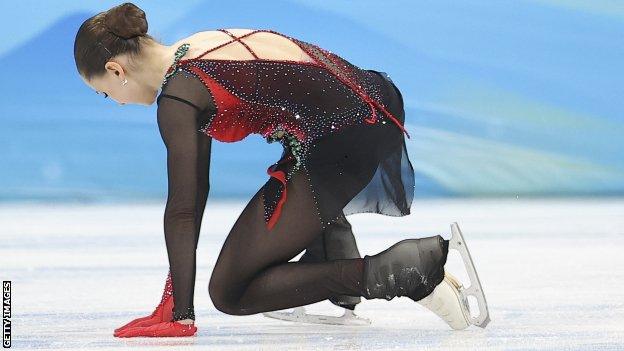Kamila Valieva: Wada warns Rusada of court action over doping case delay
- Published

Kamila Valieva helped the Russian Olympic Committee win gold in the team event at the 2022 Winter Olympics in Beijing
The World Anti-Doping Agency has expressed concern over the delayed doping investigation into Russian figure skater Kamila Valieva.
Russia's anti-doping agency (Rusada) said last week it would not make the results of its investigation public.
Wada president Witold Banka said it would take the matter to court if it was not resolved "promptly".
Valieva, then 15, was allowed to compete at the Winter Olympics in February despite a failed drugs test.
Banka said, external: "Wada is concerned with the ongoing delay in Kamila Valieva's case and has now put Rusada under formal notice that unless the matter is resolved promptly it will use its right to take it directly to the Court of Arbitration for Sport (Cas)."
Rusada did not name Valieva, now 16, but said in a statement last week that it would not reveal the results of its investigation "in order to protect the interests of the figure skater", adding that it "does not intend to announce the date of the hearings, the decision or other details in the case".
Travis Tygart, chief executive of the US Anti-Doping Agency (Usada), said Rusada's decision to keep the results of its investigation secret "makes a mockery of the whole process".
"If she is rightfully exonerated, then there is nothing to hide and it should be made public," Tygart said. "There is no wonder athletes and the public do not trust the global Wada anti-doping system.
"Wada, ISU (International Skating Union) and the IOC (International Olympic Committee) should immediately announce an appeal against any such decision and hold an open process, as the rules provide, so that there is confidence in the final outcome.
"Short of this, it's impossible for athletes or the public to believe what happened at the 2022 Beijing Games was real and not just another fraudulent win by the Russians like so many before, as the evidence has clearly shown."
What was the Valieva case?
Valieva was one of the biggest stories to taint the Beijing Games. The teenager was initially lauded for becoming the first woman to land a quadruple jump at a Winter Olympics, which she achieved in the team event.
But a failed drugs test in December 2021 - when Valieva tested positive for banned heart medication trimetazidine - came to light just before the team event medal ceremony was set to take place.
She was allowed to compete in the singles after a court ruling lifted her provisional ban following a series of appeals and re-appeals.
Cas pointed to "exceptional circumstances" regarding her age and the timing of the test result, which came during the Games and nearly six weeks after the sample was taken.
It said it would do Valieva "irreparable harm" if she were not allowed to compete.
But Valieva left the arena in tears after a number of stumbles and falls saw her drop from first place after the short programme to fourth following the free skate.
Her treatment by coaches was also questioned, with IOC president Thomas Bach describing the lack of comfort offered after her errors as "chilling".
With the doping case still to be resolved, the medals have yet to be awarded for the team event. The USA finished second, Japan third and Canada fourth.

Who will make the final selection? Follow the sobering journey of the women battling to be in England's Rugby League World Cup squad
Why was Emiliano Sala on that plane? Follow the investigation into the crash which killed the footballer and his pilot
